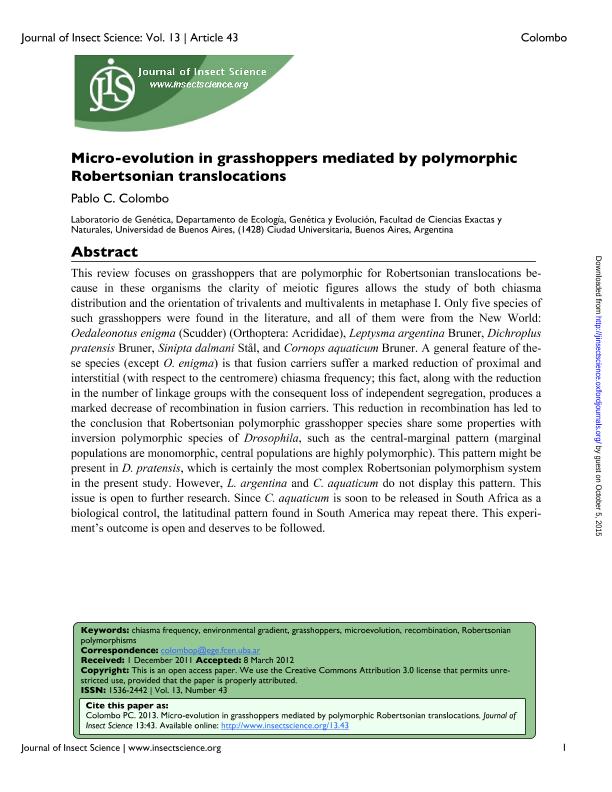Artículo
Micro-evolution in grasshoppers mediated by polymorphic Robertsonian translocations
Fecha de publicación:
01/2013
Editorial:
Oxford University Press
Revista:
Journal of Insect Science
ISSN:
1536-2442
Idioma:
Inglés
Tipo de recurso:
Artículo publicado
Clasificación temática:
Resumen
This review focuses on grasshoppers that are polymorphic for Robertsonian translocations because in these organisms the clarity of meiotic figures allows the study of both chiasma distribution and the orientation of trivalents and multivalents in metaphase I. Only five species of such grasshoppers were found in the literature, and all of them were from the New World: Oedaleonotus enigma (Scudder) (Orthoptera: Acrididae), Leptysma argentina Bruner, Dichroplus pratensis Bruner, Sinipta dalmani Stål, and Cornops aquaticum Bruner. A general feature of these species (except O. enigma) is that fusion carriers suffer a marked reduction of proximal and interstitial (with respect to the centromere) chiasma frequency; this fact, along with the reduction in the number of linkage groups with the consequent loss of independent segregation, produces a marked decrease of recombination in fusion carriers. This reduction in recombination has led to the conclusion that Robertsonian polymorphic grasshopper species share some properties with inversion polymorphic species of Drosophila, such as the central-marginal pattern (marginal populations are monomorphic, central populations are highly polymorphic). This pattern might be present in D. pratensis, which is certainly the most complex Robertsonian polymorphism system in the present study. However, L. argentina and C. aquaticum do not display this pattern. This issue is open to further research. Since C. aquaticum is soon to be released in South Africa as a biological control, the latitudinal pattern found in South America may repeat there. This experiment’s outcome is open and deserves to be followed.
Palabras clave:
Centric Fusions
,
Orthoptera
,
Chiasma Frequency
,
Environmental Gradient
Archivos asociados
Licencia
Identificadores
Colecciones
Articulos(IEGEBA)
Articulos de INSTITUTO DE ECOLOGIA, GENETICA Y EVOLUCION DE BS. AS
Articulos de INSTITUTO DE ECOLOGIA, GENETICA Y EVOLUCION DE BS. AS
Articulos(OCA CIUDAD UNIVERSITARIA)
Articulos de OFICINA DE COORDINACION ADMINISTRATIVA CIUDAD UNIVERSITARIA
Articulos de OFICINA DE COORDINACION ADMINISTRATIVA CIUDAD UNIVERSITARIA
Citación
Colombo, Pablo Cesar; Micro-evolution in grasshoppers mediated by polymorphic Robertsonian translocations; Oxford University Press; Journal of Insect Science; 13; 1; 1-2013; 1-22
Compartir
Altmétricas




